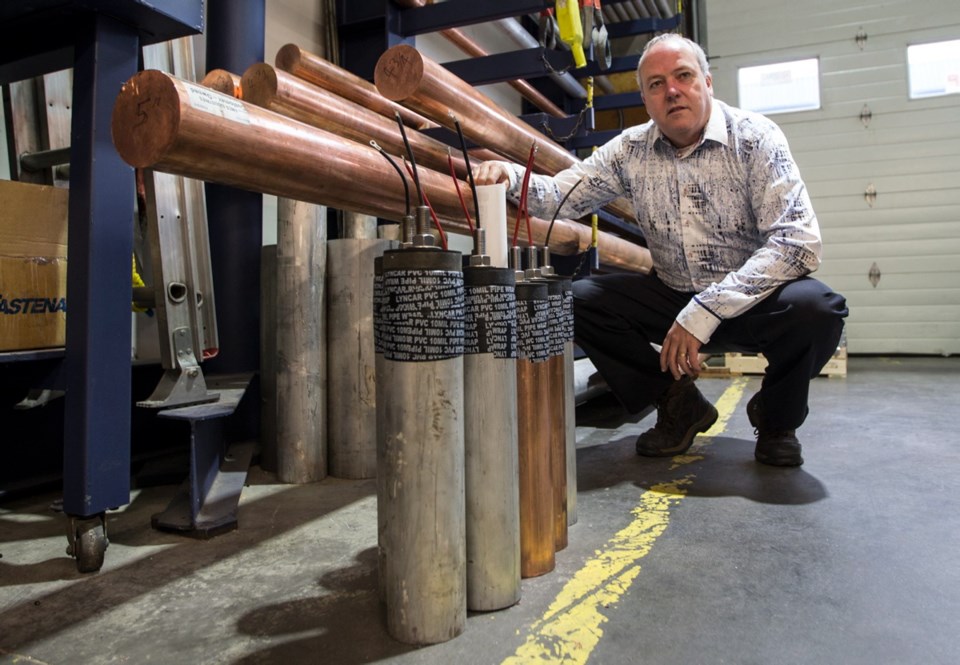A small Vancouver Island company that for more than 60 years has quietly played a big role in the shipping industry is about to open a new window on the marine world.
Sidney’s EMCS Industries, which has been designing and manufacturing anti-fouling and anti-corroding systems for the shipbuilding industry since 1955, will soon have an operation in Genoa, Italy, the first of several international manufacturing operations.
EMCS Industries has entered into an agreement with Canada Metal that will see the companies combine to offer the shipping industry a one-stop shop for anti-fouling and anti-corrosion
products.
“Pulling this off with Canada Metal is gigantic for us,” said EMCS chief executive Trevor Tasker. “It puts us not only in Europe, but it puts us in Australia, China and the U.S.”
Tasker said when he visited shipyards around the world, he was told by a number of companies that EMCS’s products would be used if only they were on site.
“They said you need to be here,” he recalled. “Since then, I have been trying to find a way to take a small company and be a factor in Europe.”
The deal with Canada Metal does that. Under terms of the agreement, EMCS will provide its expertise and proprietary technology to Canada Metal, which in turn will offer manufacturing space in its various outlets around the world.
“For us, it’s immediate infrastructure and an immediate distribution network,” said Tasker.
What Canada Metal gets out of the deal is a more diversified line of anti-fouling and anti-corroding products.
Canada Metal manufactures a variety of marine products, including sacrificial anodes used to prevent corrosion.
By partnering with EMCS, it adds anti-fouling technology that has been in use around the world since 1955.
EMCS’s flagship product is the Marelco anode system. The system employs copper anodes that produce ions in small concentrations to be carried through sea water into the exposed areas of a vessel. This process keeps pipes and pumps protected from marine life that can attach and create blockages.
Those anodes will now be manufactured under license to Canada Metal. The deal also includes other anti-fouling systems EMCS manufactures, such as its Noxx system, designed for smaller boats, that uses a low-frequency pulse to dissuade marine life from attaching to hulls and other parts of the vessel.
“[Canada Metal] has factories in Vancouver, huge facilities in Norfolk [Virginia]), Italy, Australia and China — they use us and we use them,” said Tasker. “Our sign will be on the buildings in all those countries and that makes a big difference when dealing with those shipyards.”
“This announcement is good news for both EMCS and for Canada Metal,” said Canada Metal president John Mitchell. “It allows both companies to leverage significant synergies and efficiencies in order to take full advantage of the opportunities ahead.”
For EMCS there are great expectations for the new partnership. The company, which is expanding its Sidney facility with a showroom to highlight its products for recreational boaters, envisions further expansion, hiring and increased sales as a result.
“We started off as a small company. We now do about $1 million a year in revenue. We want to grow to be a $10- million company,” said Tasker, noting since he bought the company in 2015 it has doubled its sales.
EMCS has contracts with B.C. Ferries, Carnival Cruise Line, Washington State Ferries, Princess Cruises, Holland America Lines and both the Canadian and U.S. coast guards.
“I do know that until we can manufacture overseas we can’t be as effective,” he said. “Now we are on the ground in Europe, then China and the U.S. and Australia. The potential is huge.”



